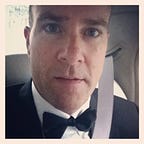WHEN TO SPEAK UP: AN OUTSIDER’S PERSPECTIVE
It was a surprise to many when, in the days following the unrest in Ferguson, Missouri, Sierra Club leadership — an organization synonymous with environmental protection — spoke out on the issue of race. I sat down with the D5 Coalition to discuss the decision to weigh in on “non-environmental” issues and why advancing DEI is critical to the Sierra Club’s work.
This story is from the annual D5 State of the Work report.
When people ask me why it’s important for the Sierra Club to weigh in on “non-environmental” issues like racism, voting rights, and immigration, I like to quote Martin Luther King: “Injustice anywhere is a threat to justice everywhere.”
From Henry David Thoreau to John Muir, the environmental movement was founded on a firm belief in the moral distinction between right and wrong. Injustice is clearly wrong, of course — but so is indifference to injustice. Silence becomes complicity. To quote Dr. King again, “In the End, we will remember not the words of our enemies, but the silence of our friends.”
Not everyone agrees. Some thoughtful and well-intentioned people have questioned whether, by speaking out on these issues, the Sierra Club risks becoming less effective at what one letter writer referred to as our “fundamental issue of environmental protection.”
I understand that concern, but the Sierra Club’s Board of Directors and I believe that exactly the opposite is true.
“I like to quote Martin Luther King: “Injustice anywhere is a threat to justice everywhere.”
Injustices in our political system and in our culture also empower polluters and lead to the destruction of our most cherished places. Working toward a just, equitable, and transparent society is utterly essential if we want to meet unprecedented environmental challenges like climate disruption. To prevail, we need as many people as possible to find common ground in opposition to our true adversaries: greed, fear, ignorance, and self-interest.
You needn’t look far to find that common ground, either. The same economic logic that drives corporations to cut costs by paying poverty wages also drives them to conduct their businesses unsustainably. When people of color are systematically denied the right to vote, the corrosive effect on our democracy serves the interests of wealthy polluters. And when a coal-burning power plant is built near a community of color, it’s a lost opportunity for clean energy.
Once we come together, we will be both righteous and powerful, but we’re not there yet. The single greatest weakness of the environmental movement today — including the Sierra Club — is that, despite many years of talking about the importance of diversity, equity, and inclusion, we still can’t say we’re fully walking the walk. We still don’t reflect the demographics of the communities in which we live and work.
“Once we come together, we will be both righteous and powerful, but we’re not there yet.”
I’m hopeful that, for the Sierra Club, this is finally changing. In May of 2015, our Board of Directors adopted a multi-year DEI plan that details the immediate and short-term steps required to advance our work through 2018. Why do I believe this effort will succeed where others have not?
First, because I can already see how this organizational commitment is positively affecting our environmental work. We are finding allies we never had before. When we stand in solidarity with other communities in their struggles, we find that they become powerful partners. Second, because we are holding ourselves accountable — just as we would with any other campaign. If there is anything we’ve learned from decades of disappointing progress on this issue, it’s that good intentions are not enough. Deadlines, diligence, and data are essential.
We’re not Pollyannas. We harbor no illusions that we can end all of the injustice in the world. But if we can make a difference by doing our own part and through righteous support, we should.
